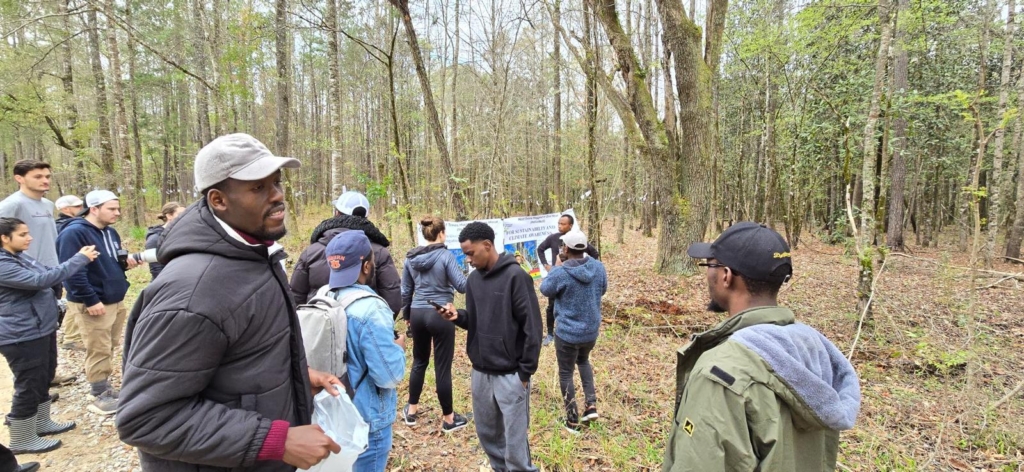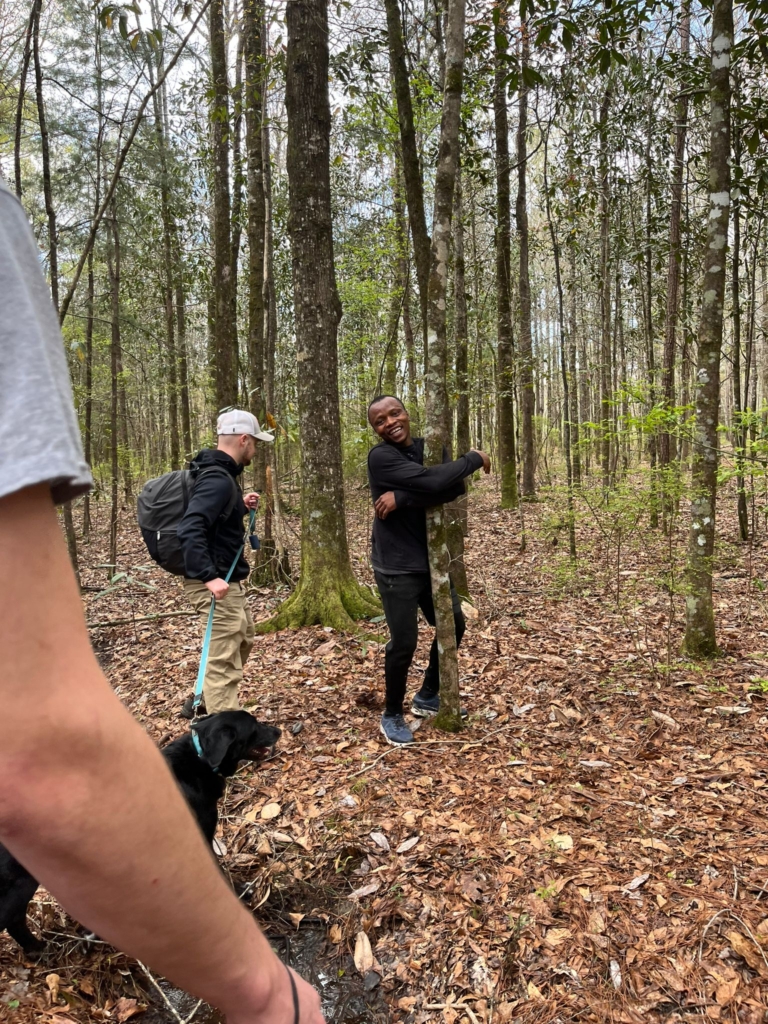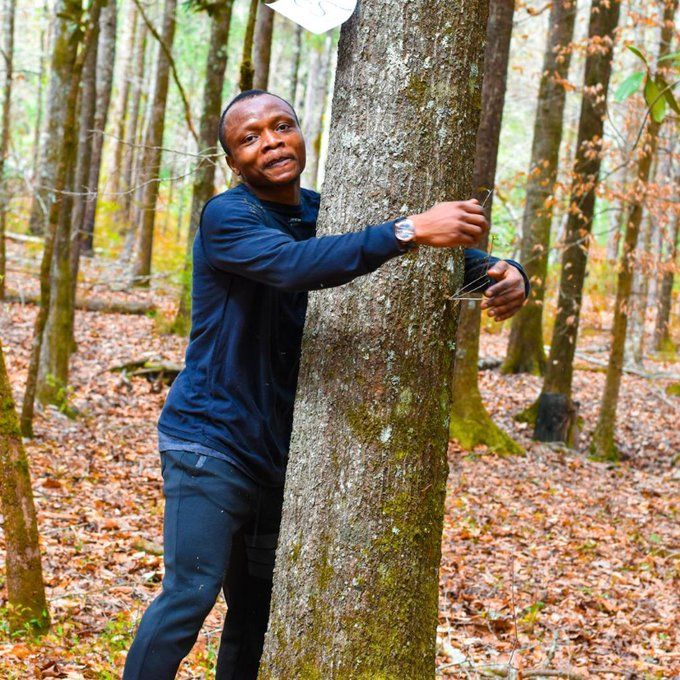Ghanaian environmental activist and forestry student currently pursuing his master’s at Auburn University in the United States, has set a new world record for the most trees hugged in one hour.
29-year-old Abubakar Tahiru hugged a total of 1,123 trees, averaging almost 19 per minute to have his name in the Guinness World Record (GWR).
Abubakar says the hardest part of the record attempt was having to move quickly between trees while ensuring that each hug met the required standards. He also found the repetitive hugging motion to be quite tiring.
What made his record attempt even harder was the fact that he was fasting for Ramadan thus could not consume any water.
“Not being able to drink water throughout the attempt posed a significant challenge, especially given the physical exertion required,” Abubakar told GWR.
Myjoyonline’s Assisting News Editor, Ebenezer Afanyi Dadzie, engaged Abubakar Tahiru in the following interview.

Interviewer: Can you tell us about yourself?
Abubakar: I am 29 years old, originally from the Upper East Region of Ghana. I was born and raised in Tepa, a farming community that instilled in me a deep passion for nature. My formative years were spent living and learning amidst the lush landscapes that shaped my early understanding of the environment.
Basic/Secondary education
My educational journey began at Sikafrebogya D/A Primary School, a place in dire need of better facilities and resources to create a conducive learning environment. I started my junior high school education at Manfo R/C in Tepa but completed it at T.I Ahmadiyya in Asafo-Kumasi. After passing my B.E.C.E exams, I had to pause my education for three years to gather funds before continuing with my senior high school education at Prang Senior High School on the Atebubu-Yeji road.
Tertiary Education
I completed my Bachelor of Science degree in Natural Resources Management, specializing in Forestry, at the University for Development Studies in Tamale in 2021, where I graduated with first-class honours. In 2023, I moved to the United States to begin my master’s studies in Forestry at Auburn University.

Throughout my academic journey, I have held various leadership roles, from school prefect at T.I Ahmadiyya to Public Relations Officer (PRO) at UDS Nyankpala campus and serving as the Main Speaker of Parliament for the central UDS SRC. It is also worth noting that I participated in the renowned National Science and Math Quiz in 2015, representing Prang Senior High School. Despite having spent several years out of formal education after junior high school, my impact was significant.

Interviewer: On what specific date did you carry out the GWR attempt?
Abubakar: I made the attempt on 23rd March 2024. After submission, it took me only 6 days for the record to be approved.
Interviewer: How did the idea to undertake a Guinness Book of Record attempt come about?
Abubakar: The idea to undertake a Guinness World Record attempt originated from my deep-rooted passion for environmental conservation and my desire to make a significant impact. As a forestry student deeply involved in sustainability, I wanted to do something unique that would not only challenge me but also highlight the importance of trees and sustainable practices on a global platform. The record for “Most Trees Hugged in One Hour” seemed like a perfect way to merge my commitment to the environment with an engaging, public demonstration of support for nature.

Interviewer: Why did you settle on hugging trees of all the attempts in the world?
Abubakar: I chose to attempt the “Most Trees Hugged in One Hour” record because it aligns closely with my forestry background and passion for environmental conservation. This symbolic act highlights the crucial relationship between humans and nature, emphasizing the importance of trees in our ecosystem and the need for their protection.
Interviewer: What would you say to anyone who says that this was merely an act of self-glory?
Abubakar: I would explain that this record attempt was far more than an act of self-glory. It was a platform to raise awareness about the importance of trees and environmental sustainability. By undertaking this challenge, I aimed to spotlight the critical need for sustainability, and climate change, and to inspire others to take action for the health of our planet. This was about making a statement and rallying global support for a cause much larger than myself.
Interviewer: Are you the first person to undertake this particular GWR attempt?
Abubakar: Yes
Interviewer: How does it feel being confirmed as the record holder in this endeavour?
Abubakar: Being confirmed as the record holder is incredibly gratifying. It feels rewarding to see our collective efforts recognized on such a significant platform, and it strengthens my commitment to continue advocating for environmental conservation and sustainability.
Interviewer: What does it mean to your passion for the environment and climate change generally?
Abubakar: Holding this record reinforces my passion for the environment and underscores the urgency of addressing climate change. It affirms the importance of our connection to nature and motivates me to continue working towards sustainable solutions that protect our planet for future generations.
Interviewer: Some people find this kind of record strange and laughable. What would you say to such people?

Abubakar: I understand that the concept of hugging trees for a record might seem unusual at first. However, this attempt was designed to draw attention memorably and engagingly to critical issues like deforestation, and climate change by engaging in sustainable practices where activities such as timber harvesting, and mineral mining protect wildlife, water quality, and the natural ecosystem as a whole. By using a unique approach, we can spark conversations and inspire a broader audience to think about and act on environmental sustainability. Sometimes, unconventional methods are what it takes to raise awareness and make a lasting impact.
Interviewer: How do you feel about the negative comments?
Abubakar: While it’s natural to feel a bit disheartened by laughter or teasing, I understand that not everyone will initially see the deeper purpose behind such a unique attempt. My focus remains on the larger goal of raising awareness and promoting action for environmental sustainability. I hope that, over time, even those who find the attempt amusing might come to appreciate the serious message and commitment behind it, and perhaps be inspired to think more about their impact on the environment.
Interviewer: How do you also feel about the positive reactions so far?
Abubakar: The positive reactions and support from social media have been incredibly encouraging. It’s heartening to see our message resonate with so many. To everyone who has offered encouragement and shared our story, thank you. Your support motivates me to continue advocating for environmental sustainability and reminds us of the powerful impact we can achieve together.
Interviewer: What more do you hope to achieve in contributing to climate change globally?
Abubakar: If I am to be remembered, I hope it’s not just as the person who set a Guinness World Record, but as someone who used this platform to advocate for sustainability and environmental awareness. It’s important to me to inspire the youth in Ghana, especially those from less privileged communities like the one I grew up in, showing them that it’s possible to rise above challenges and make a significant impact. This record is a testament to my commitment to nature and my desire to inspire others to pursue their educational and environmental goals passionately.

Following this record, I plan to deepen my involvement in the forestry sector by advancing sustainable forestry practices and expanding educational outreach. I aim to collaborate with environmental organizations to promote sustainable development projects, focusing on integrating these practices into community forestry initiatives. My goal is to use the recognition from this record to foster greater environmental stewardship and inspire future forestry professionals.
Interviewer: What do you consider to be the differences in the way the environment in Africa is treated as against the West?
Abubakar: One of the most staggering differences in environmental treatment between Ghana, and more broadly Africa, and the West is in resource management and conservation practices. In Ghana, and many parts of Africa, there’s often a more immediate, survival-focused interaction with the environment, which can lead to practices like deforestation for agriculture or fuel.
In contrast, many Western countries have moved towards more sustainable management practices, driven by regulations and a greater public awareness of environmental issues. This includes advanced forestry management, conservation efforts, and the integration of technology to monitor and protect ecosystems. However, both regions face unique challenges and opportunities for improvement in how they interact with and protect their natural environments.

Interviewer: What would be your message to Ghana, Africans and the rest of the world regarding our disposition towards environmental issues and climate change?
Abubakar: My message to Ghana, Africans, and the global community is to recognize the urgent need to shift our approach towards more sustainable interactions with our environment. We must all take responsibility for our impact on the planet, recognizing that every action counts. It’s essential for us to embrace sustainable practices, such as reforestation, using renewable energy, and reducing waste. For policymakers, it’s crucial to enforce and support environmental regulations that protect our natural resources. Let’s all commit to being stewards of the earth, working together to ensure a healthy planet for future generations. The time to act is now, with urgency and purpose, to combat climate change and safeguard our shared environment.
Interviewer: What are your major future goals in terms of your career and the impact you seek to make on the world?
Abubakar: My primary career goals are to enhance sustainable forest operations, improve operational efficiency, reduce costs, and minimize environmental impacts. I aim to develop and implement forestry practices that balance ecological sustainability with economic viability, emphasising carbon sequestration and climate change mitigation.
I am also dedicated to educating and mobilizing global communities on sustainability, promoting actions that balance environmental health with economic needs. Ultimately, I strive to integrate advanced technologies and best practices to ensure that forestry management not only supports the planet’s health but also provides sustainable growth opportunities.
Interviewer: Achieving such feats opens certain doors and opportunities. Have any opportunities come your way so far?
Abubakar: While specific opportunities related to my Guinness World Record attempt have not yet materialized, I am optimistic about the future and eagerly anticipate potential collaborations. Breaking this record has significantly raised my profile in the field of environmental conservation, and I look forward to leveraging this visibility to foster partnerships and initiatives that further promote sustainability and effective forest management practices. I am excited about the prospect of working with like-minded organizations and individuals who are committed to making a positive impact on our environment.
Interviewer: Thank you for speaking to Myjoyonline.com. It was a great pleasure talking to you. Congratulations once again.
Abubakar: Thank you for having me.

